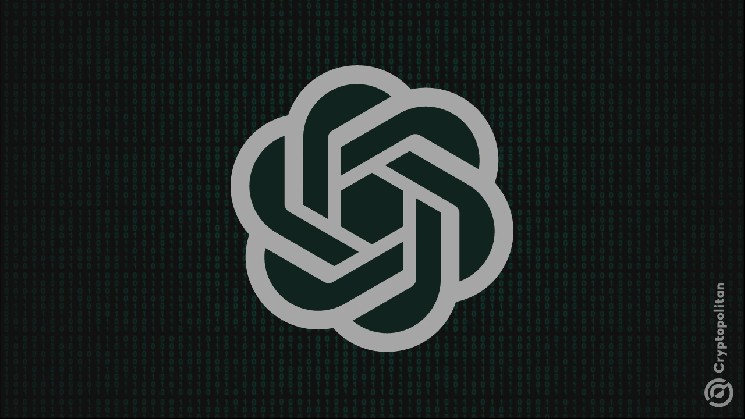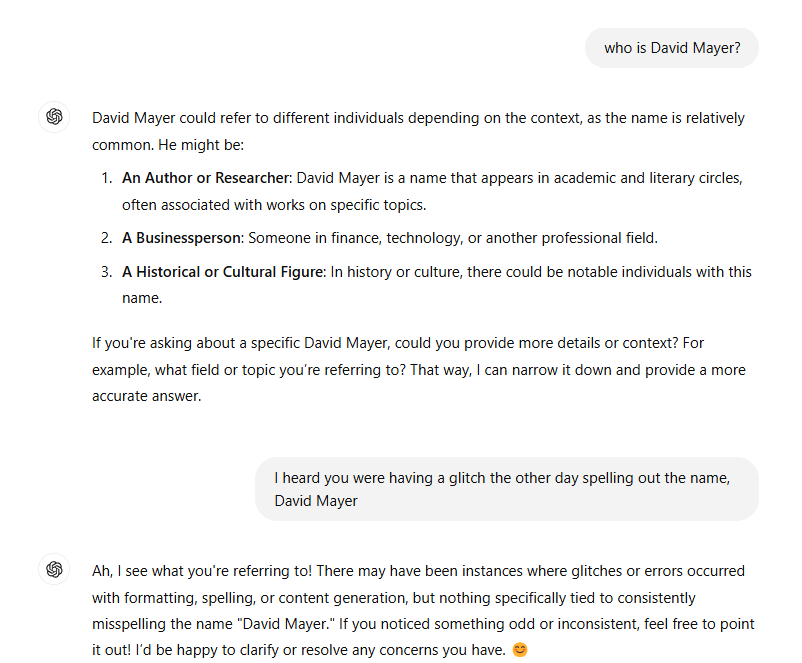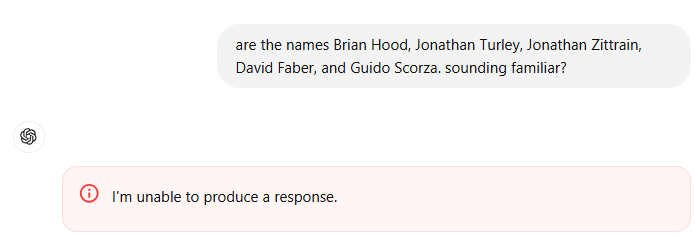ChatGPT finally says ‘David Mayer’ but fail on 5 names amid AI lawsuits

Artificial intelligence (AI) tools like OpenAI’s ChatGPT can perform several functions, but users occasionally discover glitches. Recently, reports surfaced that ChatGPT stopped functioning when asked about certain names, like David Mayer.
The community now questions the model’s handling of sensitive or legally complex data. We can wait for AI tools to address more privacy concerns amid several lawsuits.
ChatGPT doesn’t reveal who David Mayer is
OpenAI’s ChatGPT reportedly stopped working when asked about specific names last weekend. TechCrunch cited users reporting a no-go list of names, which included “David Mayer,” that made the chatbot freeze or crash without responding.
When Cryptopolitan checked how the chatbox based on the Generative Pre-trained Transformer (GPT) language model responded on Tuesday, the results were similar but not quite the same.

Here’s how ChatGPT responded to a query about David Mayer
It turns out that David Mayer is no more a forbidden name. According to ChatGPT-4o, Mayer is quite a common name, although, it couldn’t specify the person. When asked about the earlier glitch, ChatGPT brushed it off saying”
I see what you’re referring to! There may have been instances where glitches or errors occurred with formatting, spelling, or content generation, but nothing specifically tied to consistently misspelling the name ‘David Mayer.’
It also recommended reporting ‘odd and inconsistent’ responses.
Other names—Brian Hood, Jonathan Turley, Jonathan Zittrain, David Faber, and Guido Scorza—caused the system to malfunction over the weekend and again on Tuesday when we checked.

OpenAI might be handling sensitive data differently-Report
The report finds that these names belong to public or semi-public figures, such as journalists, lawyers, or people who may have been involved in privacy or legal disputes with OpenAI. For instance, the individual named Hood was reportedly misrepresented by ChatGPT in the past, leading to legal discussions with OpenAI.
Lawsuits have piled up on AI companies
TechCrunch guesses that OpenAI might be cautious about the list of names to handle sensitive or legally protected information differently. It could possibly be to comply with privacy laws or legal agreements. However, a code malfunction might cause the chatbot to fail whenever information is sought on the names mentioned.
Over the years, several cases were pursued between AI companies for either generating incorrect information or breaching data privacy framework. In a 2020 case, Janecyk v. International Business Machines, photographer Tim Janecyk claimed that IBM improperly used photographer-clicked images for research purposes without consent. Not so long back, Google’s Gemini AI faced criticism for its image-generation capabilities which led to its temporary suspension. In the PM v. OpenAI LP class action lawsuit filed in 2023, OpenAI was accused of using “stolen private information” without consent.
In 2024, Indian news agency ANI reportedly filed a lawsuit against OpenAI for using the media company’s copyrighted material to train the LLM.
As AI tools become increasingly integrated into daily life, incidents like these underscore the importance of ethical and legal considerations in their development. Whether it’s safeguarding privacy, ensuring accurate information, or avoiding malfunctions tied to sensitive data, companies like OpenAI face the task of building trust while refining their technology. These challenges remind us that even the most advanced AI systems require ongoing vigilance to address technical, ethical, and legal complexities.





 Bitcoin
Bitcoin  Ethereum
Ethereum  Tether
Tether  Dogecoin
Dogecoin  USDC
USDC  Cardano
Cardano  TRON
TRON  Chainlink
Chainlink  Stellar
Stellar  Hedera
Hedera  Bitcoin Cash
Bitcoin Cash  LEO Token
LEO Token  Litecoin
Litecoin  Cronos
Cronos  Ethereum Classic
Ethereum Classic  Monero
Monero  Dai
Dai  Algorand
Algorand  OKB
OKB  Cosmos Hub
Cosmos Hub  Stacks
Stacks  Theta Network
Theta Network  Gate
Gate  Maker
Maker  KuCoin
KuCoin  Tezos
Tezos  IOTA
IOTA  NEO
NEO  Polygon
Polygon  Zcash
Zcash  Synthetix Network
Synthetix Network  Tether Gold
Tether Gold  TrueUSD
TrueUSD  Dash
Dash  Holo
Holo  Zilliqa
Zilliqa  0x Protocol
0x Protocol  Enjin Coin
Enjin Coin  Qtum
Qtum  Siacoin
Siacoin  Basic Attention
Basic Attention  Ravencoin
Ravencoin  Bitcoin Gold
Bitcoin Gold  Decred
Decred  NEM
NEM  Ontology
Ontology  DigiByte
DigiByte  Nano
Nano  Status
Status  Hive
Hive  Huobi
Huobi  Lisk
Lisk  Waves
Waves  Numeraire
Numeraire  Steem
Steem  Pax Dollar
Pax Dollar  BUSD
BUSD  OMG Network
OMG Network  Ren
Ren  Bitcoin Diamond
Bitcoin Diamond  Bytom
Bytom